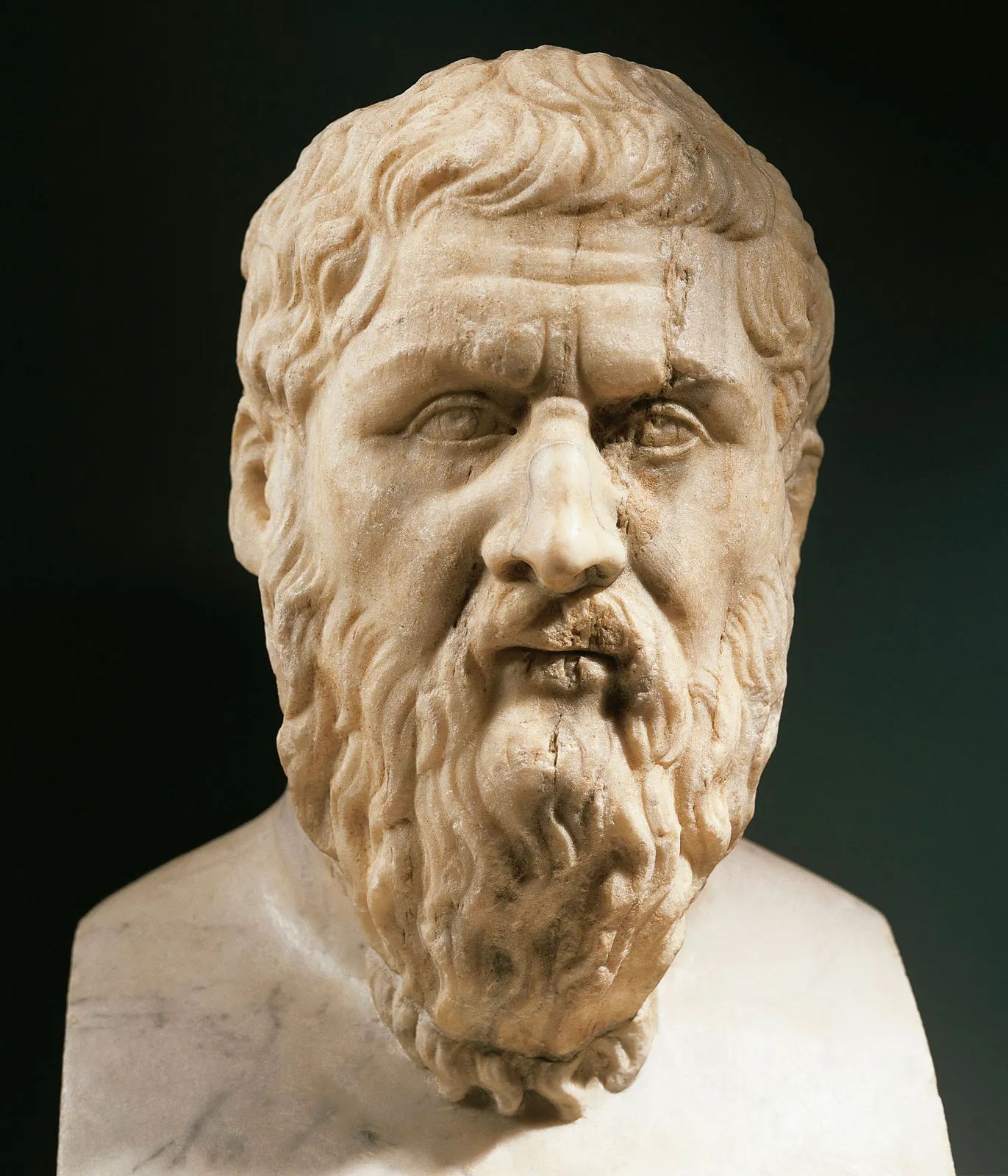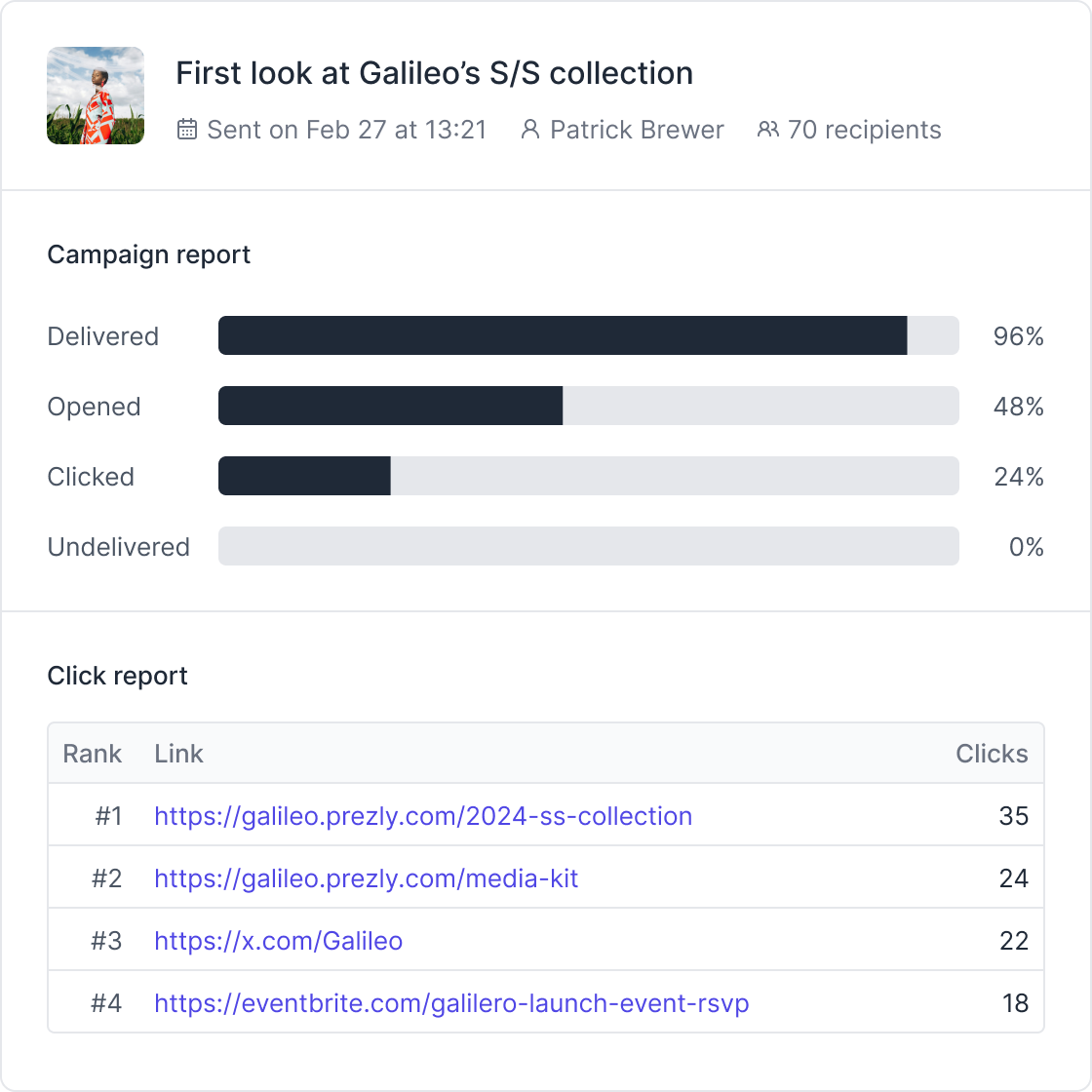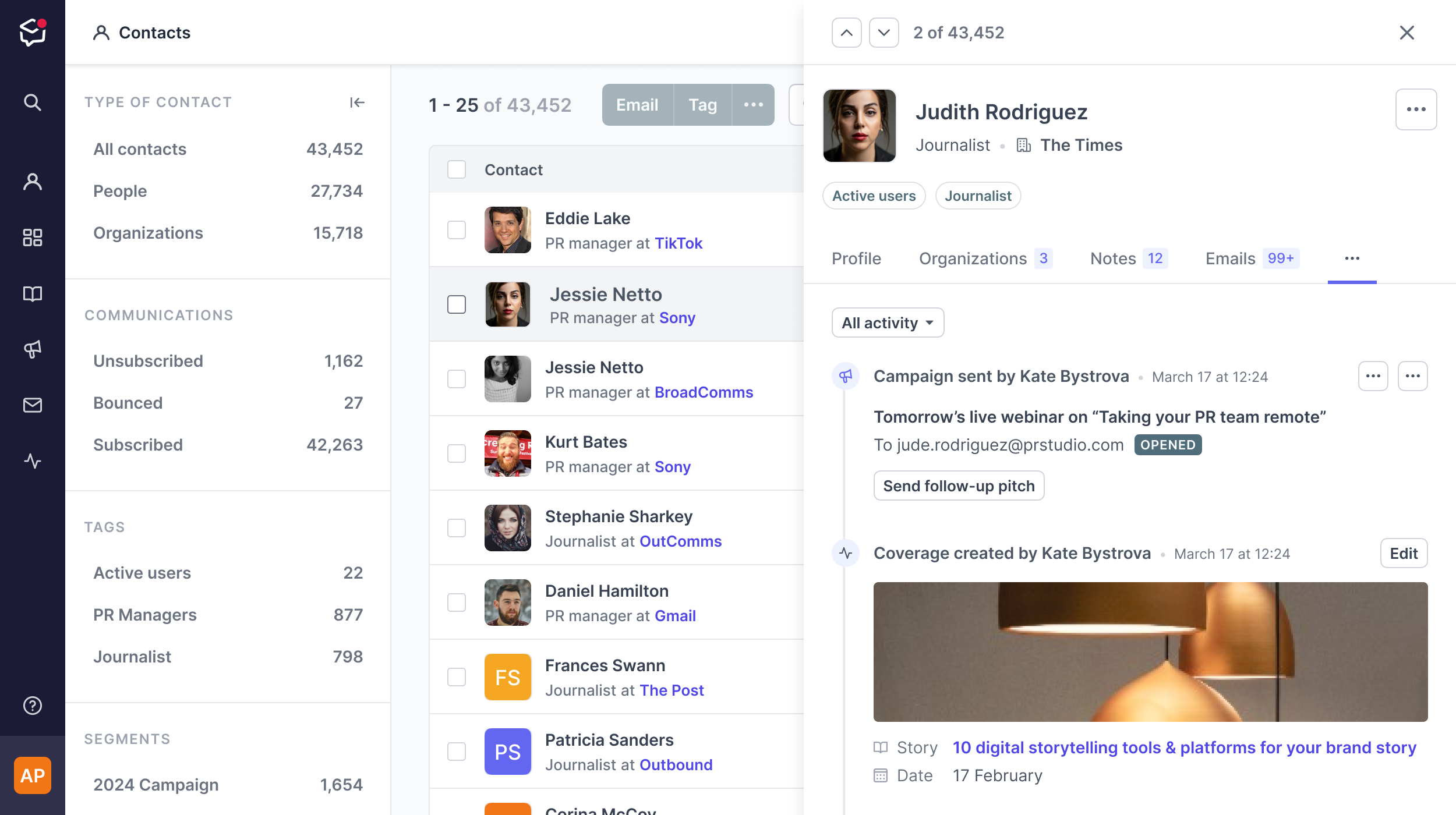How to take advantage of influencer marketing in PR
We talked to influencers, marketers, and public relations insiders to understand why influencer marketing PR is the future of connecting with customers.
Influencers are the new celebrities. Celebrities are also still kind of celebrities, but they are less celebrities now more than ever, thanks to influencers. As social media takes over every facet of our very lives, we no longer look to heavily curated Hollywood starlets and heartthrobs for trends and fashion. No, now we look to 19-year-olds who post dancing videos in their parents' basements in front of the brightest ring light you've ever seen.
So, what are influencers, and how are they transforming how brands find and connect to new customers? What do those in public relations need to know to harness the power of influencers for their campaigns? And how can they go about doing it?
Answers to all these and more in today's excruciatingly detailed article.
Pitch journalists right now with a 14-day free trial
- Identify your most engaged contacts with our PR CRM
- Send personalized email pitches and campaigns
- Publish your press releases in a professional newsroom

First, let’s define an “influencer”. An influencer is somebody who can connect with other people. This definition is vague, but so is the nature of influence. There are sports influencers, political influencers, fashion influencers, literary influencers, and even academic influencers (nerds).
Many influencers are literally famous for being famous. They gained a social media following, and now they just kind of… exist. Famously. And they have tons of influence for doing so. And arguably too much money.
Technically speaking, "those with influence" have existed for as long as humanity has been around (at least several hundred years). Today, however, the phrase "influencer" denotes a certain level of social media and internet fame. Calling Plato, for example, an influencer, while technically correct, will make people (particularly those under 25) laugh at you.

From a PR perspective, Influencer Marketing is the shift in recognizing there are new ways to reach your audience or public. Traditionally, that used to be high-net-worth individuals or journalists, and now it can be anyone with their own network or media of their own.
– Stephen Waddington, Founder, Wadds Inc.
For our purposes, an influencer is defined as someone:
- With an online presence
- Who has built an audience
- And has some influence over said audience
Everything else is basically up for debate. Because of the democratized nature of social media and the tantalizing possibility of virality, basically anyone can be an influencer. You can go from being a complete nobody today to a worldwide sensation tomorrow with a single post. This… has proven to be a mistake for many who cannot handle public scrutiny en masse. But that's a topic for another day.
Because there's a lot of overlap, the two are often conflated. However, all influencers are content creators (people who create some sort of content, whether that's video content, Twitch video-game streaming, pictures on Instagram, etc), but not all content creators are influencers. No matter how damn hard we try.
Some content creators stay anonymous, or deliberately decide not to build a following. Other creators don't do brand deals or generally don't prioritize profiting from their content. Generally speaking, though, by our definition, the majority of content creators are, in fact, influencers in their own right. Just maybe teeny tiny ones.
Examples of famous influencers include:
- Charli & Dixie D'Amelio – The definition of famous for being famous, the D'Amelio sisters have a combined TikTok following of over 200 million with billions of views between them. They became famous for their TikTok dancing or something and have remained famous for no discernible reason.
- PewDiePie – This Swedish Youtuber has been, at various points in his career, the most subscribed-to Youtuber in the world. His 111+ million subscribers tune in to watch him play video games, shout, and provide commentary on things like memes, funny videos, and 17th-century baroque architecture (I assume, I've never seen his videos).
- The Kardashians – The family has remained plastered all over headlines for going on 75 long years now, thanks to their collective inability to feel shame. Their family claim to fame is "being rich", "being controversial", and "never turning down a brand deal, no matter how questionably ethical".
While these are some of the more famous, silly, and controversial influencers, the reach and relevance of the influencer community go far beyond the most famous and shameless examples. We will talk more about this later, but influencers can have anywhere from a few hundred followers up to millions of followers and still have an important place in modern marketing.
Speaking of which, let's talk about what influencing has to do with PR.
Prezly – software for modern PR teams
Write & publish brand stories in an online newsroom
Send email campaigns, pitches & newsletters
Manage all your contacts in a single CRM, with easy import & export
Measure performance with analytics & built-in media monitoring

So, we understand internet stars. We get their role in society. But what does that have to do with public relations? Well, with the rise and proliferation of social media, brands saw these creators and thought, "I'm gonna make money off of that."
Hence, the brand deal was born. More and more brands started tapping the shoulders of these creators and offering them buckets of cash to create brand awareness and get their audiences to try their products and services. Check out these influencer marketing campaign examples to see how it can be done right!
- Influencer marketing is set to generate set to generate approximately $24billion by the end of 2024, according to Influencer Marketing Hub. 84.8% of their 3,000 survey respondents who use influencers felt like influencer marketing was worthwhile
- 81% of consumers reported being interested in products or services based on recommendations from influencers
- One UK study found that consumers were over twice as likely to trust influencers over a company website
- Adweek reports that 92% of consumers trust recommendations from others over branded content
- Influencer marketing is particularly popular with younger demographics who are notoriously difficult to market to
- TikTok and Instagram remain the most popular social media platforms for marketers
Getting an accurate pulse on the state of influencer marketing is a chaotic business at best. Because influencer marketing has such a wide range of audiences and niches, it can be challenging to know how much is being spent, how successful the campaigns are, and the future of influencer marketing (though sources like the State of Influencer Marketing 2024 report suggest that influencer marketing continues to grow year on year).
TL;DR: it doesn't seem to be going anywhere anytime soon.
At the onset of influencer culture online, many looked to influencers because they were "real people" and not highly polished, assembly-line celebrities. By the time social media became widespread and platforms like YouTube were starting to take off, the average person was already long tired of stars and their entitled shenanigans. But things were about to change. With YouTube, anybody could create entertaining and informative content. With Instagram, anybody could look like a model with the right filters. Thus, the influencer was born.
Influencers were relatable. The appeal of influencers, especially in the early days of social media and YouTube (2007–10 or so), was in their authenticity. The average person with an iPhone 3 and an internet connection didn't have much to lose by telling you their honest feelings about, well, anything. People became loyal fans because influencers were much more likely than celebrities to tell it like it was, engage with their audiences, and build actual communities.
One microcosmic example of the entire rise (and relative fall) of influencers can be seen in one specific community: beauty vlogging. What started as a couple of teens doing YouTube makeup tutorials for a couple dozen people turned into a multi-billion dollar industry. Beginning in the 2010s, people like NikkiTutorials and James Charles slowly built a cult following of primarily young people who enjoyed learning about makeup while watching their favorite YouTubers tell stories and be generally entertaining.
During the peak of influencer marketing, getting a code felt special – now it's baseline expectation. Seeing a product felt like a glimpse into the influencer's real life – now the automatic assumption is it's a paid ad.
The foundational fabric of expectations and assumptions around products posted online have shifted and fractured trust on this marketing channel.
However! Those creators who are able to retain, portray, and lean into demonstrating trust are often even more effective than the general influencer population in the gold rush because it feels that much more coveted and rare.
– Madeline Lieber, Chief of Staff, Gorgie
Brands started taking notice and offering these influencers PR boxes full of hundreds of dollars worth of makeup to get them to use, discuss, and review these products. PR boxes morphed into influencer discount "codes", which earned them a percentage of sales, which evolved into full-blown five- or even six-figure sponsorships.
This, understandably, began to lead to problems (across all industries) and eroded public trust and perception of influencers, which seamlessly segues us into our next section.

Gather inspiration from some of the internet's best social proof examples and use cases, plus how to effectively find, store, and use your social proof, according to the experts.
It's reasonably safe to say that the early 2010s were the heyday of influencers. Influencers got their PR boxes, sponsorships, and brand deals, while still maintaining some level of trust and integrity with their audiences. It was truly the best of all worlds (for influencers and brands). Influencers were considered the perfect blend of paid and earned media because brands could easily reach established fan bases who deeply trusted their favorite influencers. It still felt like it was an authentic parasocial relationship.
But then, the problems started.
With the massive earning potential of influencers who had hundreds of thousands or even millions of followers, the issue of transparency started to pop up. Because they weren't considered traditional employees or brand representatives, influencing became an ethical and legal grey area. How much did they have to disclose to their audiences? How did audiences know if they were getting paid versus genuinely loving a product they recommended?
This lack of transparency started to erode the trust of their audiences, and that trust is still tenuous today. This erosion wasn't helped by the fact that many influencers and content creators went absolutely wild when they realized the earning potential of leveraging their online popularity to make money.
Some started marketing incredibly dangerous, unethical, or even illegal products and services to their often young audiences. Eventually, the FTC (Federal Trade Commission) had to step in and create guidelines around endorsement disclosures, but not before several scandals broke out (like Logan Paul's infamous CryptoZoo NFT debacle).
In the early days, the great thing about influencers was that, unlike celebrities and traditional advertising campaigns, they weren't getting paid to showcase products. Now, with the rise of influencer marketing, they certainly are. How do you trust somebody who is getting paid to give you their "unfiltered" opinion? How do brands trust that their influencer marketing campaigns will be accurately and appropriately marketed?
We once had a music festival sponsored by this big alcohol brand and one of the bigger influencers we hired for this PR campaign posted about our festival and a few hours later proceeded to post about another event sponsored by the direct competitor of our client. This was of course a breach of contract, but it talks volumes of how a lot of influencers don't take their work seriously and you need to be very careful when taking care of your client.
– Carlos Figueroa, CEO, The Waldorf Agency
As influencer marketing became more prolific, influencers stopped being as picky and selective about what they advertised, and sketchy and sketchier brands started using influencers to peddle their wares. It's been a real downward spiral in the last five years or so, for audiences, brands, and influencers alike. Some influencers even complain that the work that brands are expecting is not consistent with the pay or benefits they offer.
The main change I have seen in influencer marketing over the last few years is that brands seem to be trying to squeeze more and more out of influencers. Many brands these days won't pay an influencer to feature a product, and some won't even provide the product for free in many cases. Over the years it feels as though brands are expecting more, and offering less.
– Eric Slemboski, Creator, StreamersPlaybook
With the rise of influencer culture, many aspiring influencers have tried to bolster their careers by purchasing fake engagement and followers. This became an entire industry in and of itself, with bot farms and fake engagement going for a pretty penny. While there are ways to identify these counterfeit followers, and brands have started doing their due diligence to weed out the fakes, it's still a massive industry. Many up-and-coming influencers rely on these faux followers to get a boost in an extraordinarily saturated attention market.
I haven't worked with influencers. Because followers don't equal to sales. People often only like their pictures. A lot of influencers hide their like counts.
– Liv Arnold, Director, Public Status PR
Because of the aforementioned problems, brands are now hesitant to invest insane amounts of money into just any influencer with an impressive follower count. The past few years have seen a significant shift towards smaller, niche creators over larger general creators.
We search for influencers within the client’s niche and look at their audience to determine if their reach and engagement would prove to be effective for the client's goals. Once we find a few that match, we reach out to the influencers to determine their fees and then bring this information to the client so they can then decide if they want to proceed.
Oftentimes, price can be the determining factor so even if an influencer has excellent reach and engagement, they might be out of budget for the client.
– Madison Buck, Social Media Strategist, Online Optimism
Influencers generally fall along this ranking, with some variation depending on who you talk to:
- Nano-influencers: 500–10k followers
- Micro-influencers: 10k–100k followers
- Macro-influencers (or just, "influencers"): 100k–500k followers
- Mega-influencers: 500k+
It seems to the uninitiated that the more followers you can reach, the better. However, many marketing and public relations professionals are finding that these mega-influencers are not only astronomically expensive but also convert less.
As the size of the influencer increases, so does the distrust among their audience. More brands are going with smaller influencers with strong parasocial relationships within highly specific niches. Niche creators often have the best ROI for brands, maintain the best relationships with their audiences, and are more incentivized to be selective and judicious with the types of campaigns they run.
Pitch journalists right now with a 14-day free trial
- Identify your most engaged contacts with our PR CRM
- Send personalized email pitches and campaigns
- Publish your press releases in a professional newsroom

We've talked more specifically about the nuts and bolts of starting and maintaining influencer relationships in this article: How to reach influencers as a brand or small business to promote your product. It's pretty good. I wrote it, so there is no bias here.
But if you're looking for something a little bit more brief, I'll give you the crash course for finding and establishing influencer marketing relationships below. That way you don't have to click a link. I know you're busy.
How much are you willing to spend? What kind of audience do you want to reach? How long do you want your influencer marketing campaign to run? Identifying the answers to these questions is the first step before you even begin to look for influencers. Are there micro-influencers who might better align with your mission than bigger influencers?
Over time, we've witnessed shifts in influencer marketing. Instead of just focusing on follower counts, we began to delve into the quality of content and engagement rates. We came across a micro-influencer who had a niche following that perfectly aligned with our brand. Her expertise in curating stylish looks and providing fashion advice made her a sought-after virtual stylist.
Our intention was to reach a more specific and engaged audience.
We guided her by sharing our brand's values and the unique aspects of our jewelry. She was inspired to create content that authentically resonated with her audience, offering styling tips and showcasing our pieces in various fashion ensembles. Despite her smaller reach, her campaign outperformed those of influencers with larger followings, reinforcing that authenticity is key in influencer marketing.
– Linda Zheng, Manager, Rex Jewelry
It's also good to have an idea of what you want your campaigns to look like. How do you want your influencers to use or demonstrate your product or service? It's industry standard to give your influencers guidelines and expectations for representing the brand.
Because you are a consummate professional in your industry, you probably already have a few influencers in mind. There are also websites like Upfluence and Collabstr that help brands and influencers connect.
Create a shortlist of influencers you think would appropriately represent your brand. It's always good to diversify a bit in case one or two of them don't work out. Many brands will run multiple influencer campaigns across niches and platforms to determine which audience type works best.
I mostly wish that brands would try to be relevant to my niche especially on places like Instagram. In my case, I only report gaming news, but I can't count how many times fashion/beauty brands have reached out for a promotion.
– Mazen "Mithrie" Turkmani, Editor in Chief, Mithrie
Once you have your list of dream influencers to work with, get them into whatever tool it is you use to manage your media contacts – because that's who these people are. Don't make the mistake of thinking of influencers as being a less official channel; business is still business.
Given the limitation of most social media platforms, it's likely that you'll have to assemble the contact profiles for your shiny new influencers yourself, which while manual, is a worthwhile thing to do right at the start. This is particularly important if you're working as part of a team or PR agency, since after you've done a sterling job adding these contact details to your shared PR CRM database, your entire team will be able to use them, and any email communications between you and them will be logged.
Try Prezly for free todaySome details you can include:
- Name
- Profile photo (helps your team know who to look out for at events)
- Preferred email address and any other contact details
- Social media links
- Tags showing the influencer's key areas of interest so you can filter by these later to create targeted contact lists for your campaigns
- Pinned note with any details on the influencer's preferences, activity etc
- Link to any organizations they are associated with
- If they have already talked about your brand in a social media post (and your PR tool supports it), log that as coverage so that it appears in your new influencer friend's contact profile
Most influencers make it easy to reach out because hey, they want that moolah. A lot of micro, macro, and mega influencers these days are represented by agencies, and those agencies can help facilitate the collaboration.
A sensible way to initially get in touch is via, yup, social media – it is after all their bread and butter. Saying that, if you're approaching an influencer who is used to working with brands, it's likely they'll have a dedicated sponsorship email (or that of their agent) highlighted in their profile or Link In Bio. In either case, you want to move the conversation to email as soon as possible, since this will be easier to track, preserve a history of the conversation for context, and not be hindered by petty things like file attachment limits or blatant privacy infringements.
If you work as part of a team, it is strongly recommended that you use a collaborative PR tool to communicate with your influencer. For one thing, it creates transparency of where the conversation is at, so that anyone on your team can catch up on what's going on without having to actively ask you, and can even pick up the comms thread if you fall sick or go on holiday or win the lottery and immediately retire forever (some people say they would keep working if this happened, but frankly who are they trying to kid).
I know, I know, the waiting game sucks. But just like with journalists and Tinder matches, you can't be seen to appear too desperate, or worse, annoying. So give it a few days after sending your email, go for a walk, learn to meditate. Maybe stalk their social media to see if they're online and active or away on some perfectly legitimate and definitely warranted wellness retreat.
This is where another advantage of using a PR tool built for PR email pitching comes in: engagement analytics.
If you sent your email via a tool like Prezly, you'll be able to see whether your influencer has even opened your message (as well as how many times, the eager beaver). This is useful both in one-to-one comms and bigger campaigns, and can give you a good idea of when it's time to follow up, and if you can expect to get a mention (a decent indicator is if you can see increased traffic to your press kit or newsroom).

Work with the influencer to work out the details of your arrangement, including things like exclusivity. The amount you'll pay, the length of the contract, the conditions, and all of those business details will vary wildly from influencer to influencer.
The professionals over at Influencer Marketing Hub made a comprehensive breakdown of the different influencer sizes and social channels, so check that out.
I prioritize influencers with high engagement rates over those with vast followings, as it indicates that their audience is genuinely interested in what they have to say. Reviewing an influencer's past partnerships can also give insights into how they present branded content and how their audience reacts to it. Lastly, in the age of paid promotions and sponsored content, transparency is key. Influencers who clearly disclose partnerships tend to be more trusted by their audience.
– Milosz Krasinski, Managing Director, Chilli Fruit Web Consulting
After the terms have been agreed upon and the contracts have been signed, now you wait. Wait for those customers to start rolling in, or possibly wait to send out that carefully worded retraction of your business dealings with said influencer. Either way.
With the glitz and glamour surrounding influencers, it can be all too easy to be blinded by their importance to your strategy instead of your importance to theirs. Here are five hot tips from the PR world’s own influencers about how to build and maintain influencer relationships without seeming like a simp.
Influencers don’t exist solely to benefit you. “Authenticity matters,” says Carrie Morgan, founder of The Relevancy Specialist.
Influencers are bombarded with strangers wanting to benefit from their hard work without giving anything back, and a plethora of sloppy pitches.
Morgan recommends authenticity over self-interest:
They have their own agenda and goals, the biggest of which is building a thriving community. Don’t expect to benefit from their community unless you are actually part of it first.
– Carrie Morgan, founder of The Relevancy Specialist
In order to build trust, you must be willing to get to know them as people. Digital strategist, author and speaker Jason Falls urges PR pros to build the relationship before trying to score a mention or placement.
The placements come when you have the relationship. Without it, you won’t get much. So treat them like a friend. Respect their time and interests. Be helpful to them… in ways that have nothing to do with your client or brand. Over time, those influencers will like and respect you for not trying to use them.
– Jason Falls, author
It’s easy to feel intimidated by clout and prestige, but Gini Dietrich says that shouldn’t keep you from making contact. “Don’t be afraid to start a conversation!”
So many young PR pros think, ‘That person will never answer me.’ First, you never know if you don’t try and secondly, you’ll be surprised. So find something in common – maybe it’s a common hobby, a blog post they wrote that you like, or a quick question you have about the industry – and go for it!
– Gini Dietrich, Spin Sucks
If you’re following the advice in tip #3, you should already know which conversations to join. Don’t just listen silently – contribute!
Don’t just be part of the noise.” Instead, PR pros should “seek to say something compelling that furthers the dialogue, introduces a new idea, or promotes healthy, intelligible debate.
– Rebekah Iliff, founder of WriteVest
These conversations are a golden opportunity to catch influencers’ attention, build rapport, and show them you know what you’re talking about.
Eventually, you can become a trusted source in your own right. You don’t need to be famous to do this – you just need to share relevant, useful content on a regular basis, and you need to give without asking for anything in return (for awhile, at least). But it takes time.
Sarah Evans, digital correspondent for huge brands like PayPal, Cisco, and Cox Communications, tells PR pros to:
Approach [influencers] first without a pitch. Tell them you liked their recent blog post (that you actually read!) or Snap (that you actually saw!). Offer them a media opportunity as a source in an article you’re writing (because they’re the right fit) or connect them with a journalist who needs their point of view. Invest in the ‘emotional bank account’ before asking for something first, even if it’s to be part of a paid campaign. A strong relationship goes a long way.
– Sarah Evans
The fundamentals of building influencer relationships are pretty straightforward. The hard part, as always, is sticking with it. This is where the tools and processes you use are just as important as the content you share. Good systems will help you make the right habits a regular part of your day, saving time and energy we all need more of.
The key to influencer marketing is to start small, stay consistent, and be patient. Devote a little attention to providing value for your influencers every day (10 minutes is all it takes) and success will follow.
Here are our unfiltered thoughts about why you might want to avoid using influencer PR.
The authenticity of influencers can be their greatest strength and their biggest weakness. Sometimes, your influencer can get a little bit… too authentic. And by that, I mean racist. Or sexist. Or any other incredibly problematic category that gets them and, by association, your brand, canceled.
Nobody enters an influencer partnership thinking their representative will go completely off the wall. But, time and again, we see this happen. Brands have to sever ties with a problematic influencer, losing money and credibility in the process.
The internet is filled with a growing list of prominent personalities who rose to fame and crashed hard due to some scandal, their past behavior coming to light, some offhand remark that angered the masses, or any of the other myriad ways people enrage the internet these days.
Not satisfied with seeing the subject of their ire simply embarrassed or contrite, hordes of former fans and current haters will often attempt to completely eviscerate the influencers' sponsorship deals and call for boycotts for any brands who dare associate with them. This puts the brand in the uncomfortable position of having to take a stance or make a crisis communication statement.
The internet is a terrible place.
And while the odds of this happening are low, particularly for smaller influencers, the odds are never zero.
We can get lost in the weeds discussing the right size influencer or the perfect niche audience, but frankly, sometimes influencer marketing just doesn't make sense. I know it's controversial to say that in a guide specifically about using influencer marketing. I'm sorry to have let you down. However, I'm going to continue letting you down by defending my position on this matter.
Not all types of marketing work for all industries. Many brands have tried to use influencers and it's just an awkward fit. Take medicine, for example. Do you want to see your favorite celebrity or influencer trying to sell you an over-the-counter migraine medicine? Wouldn't that be weird and dystopian?

I say all that to say, don't force it. If you can't find a natural fit for your brand, influencer marketing may not be for you. And that's okay. You can sink your entire marketing budget into something else. It might also make sense to start from within; read more on employee advocacy for your business, or check out some of the industry's top PR leaders for advice and tips.
Hopefully, this article provided a balanced insight into the wild world of influencer marketing. It can be a fantastic strategy, depending on your niche, budget, and goals. Or maybe not.
Thank you to all of the influencers and comms professionals who contributed.
If you have thoughts on influencer marketing, want to share your perspective, or rabidly disagree with anything we've stated, feel free to reach out to our content-writing influencer on X or send us an email!
Interested in seeing if Prezly can bolster your PR and marketing efforts? Try it out for free with a 14-day, no cc-required trial!
Prezly – software for modern PR teams
Write & publish brand stories in an online newsroom
Send email campaigns, pitches & newsletters
Manage all your contacts in a single CRM, with easy import & export
Measure performance with analytics & built-in media monitoring





